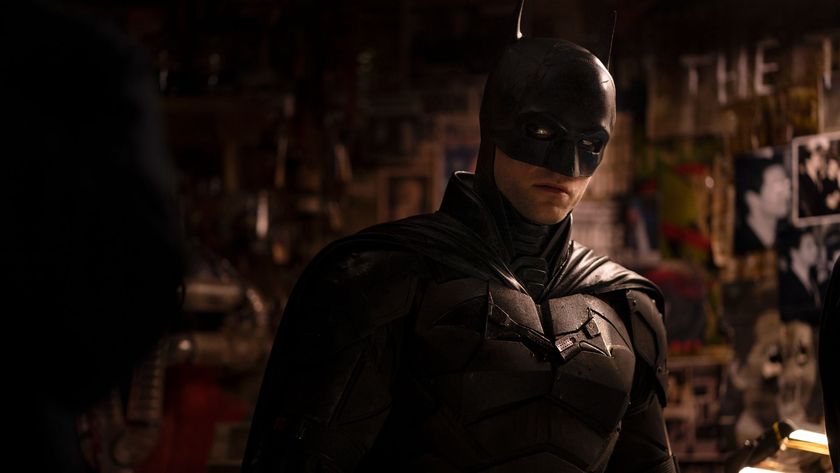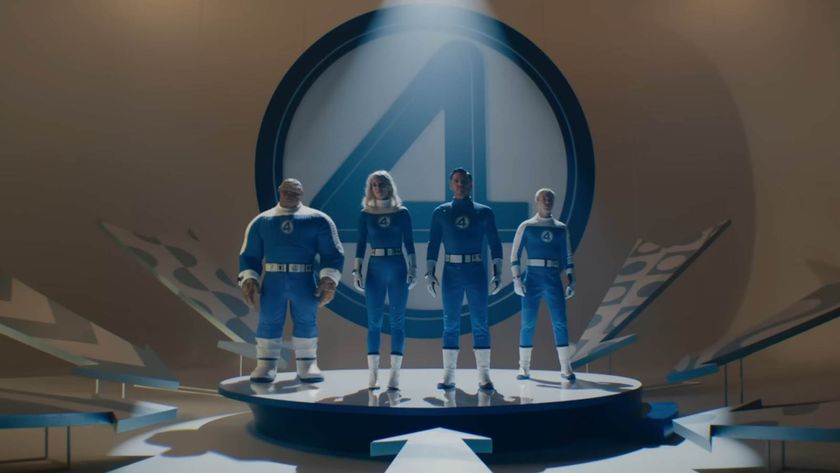Black Widow: Scarlett Johansson, Florence Pugh on the gritty prequel unlike any other Marvel movie
Scarlett Johansson and co tell Total Film about digging into the Avenger's chequered past in Black Widow
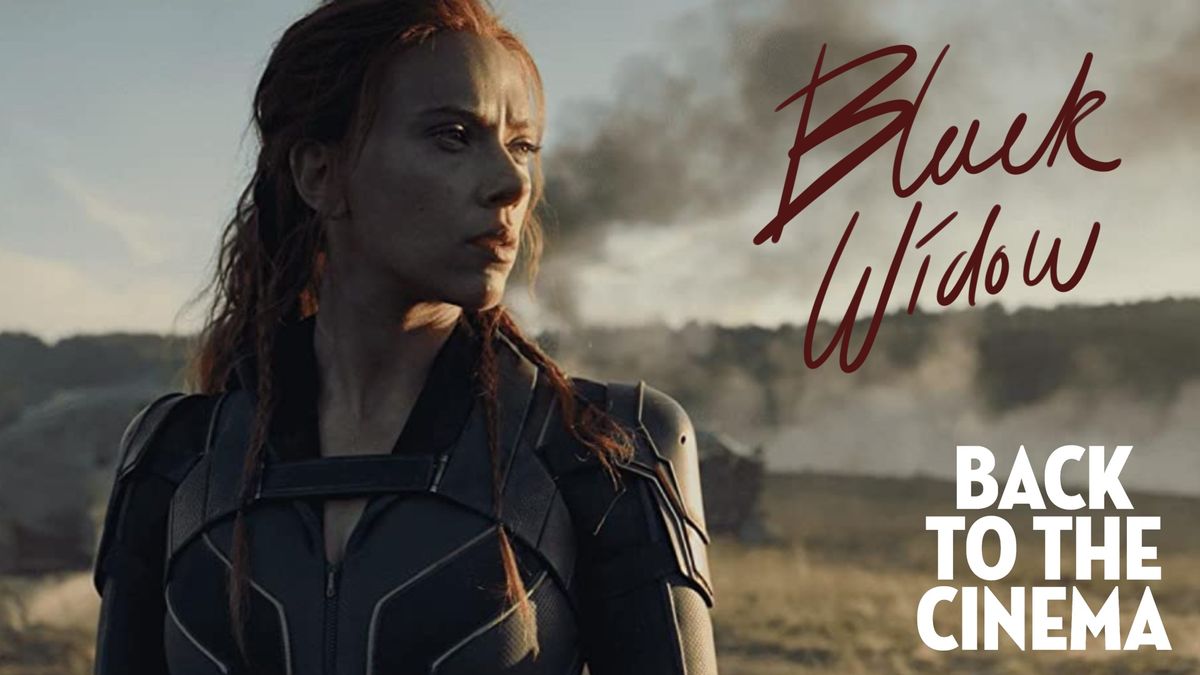
12DOVE and Total Film are celebrating the biggest new releases as we head back to the cinema! This week: Black Widow. Natasha Romanoff might have made the ultimate sacrifice in Avengers: Endgame, but her story isn't complete yet. This article first appeared in print – buy the magazine here.
Black Widow has been a long time coming. Scarlett Johansson’s red-headed, ass-kicking, non-super superhero became an instant cinematic icon the moment she punched her first nameless goon in Iron Man 2. Yet, though Johansson has spoken about her desire to make a solo movie for almost a decade, the pieces have only just fallen into place for that vision to finally become a reality. Ever since Natasha Romanoff confessed to having “red in my ledger” that she’d like to wipe out in 2012’s Avengers Assemble, viewers have known that there’s been a knotty backstory worth excavating. It’s been a lengthy wait for fans, sure, but not a frustrating one for Johansson.
“I didn’t feel the character needed to be vindicated,” she tells Total Film over Zoom after being asked about the fight to bring a solo Black Widow adventure to fruition. “When we finished Avengers: Endgame, I felt good about the work that we did. I felt that, unless we were going to go on a deep dive – which this film is... I thought, ‘OK, she’s...’”
Johansson stops for a second to meditate over her answer. She’s spent the past 10 years with Marvel’s team of spoiler-stoppers listening to her every conversation and now would not be the time to slip up, especially with the end of her Black Widow journey in sight. Behind her today, however, there are no peering press officers – just a neutral white wall with a solitary window looking out to some greenery.
“I love Natasha,” she starts up again. “She’s had an incredible 10-year journey, and I felt that she was finally able to make an active choice.” She’s referring to Black Widow’s controversial decision to sacrifice herself to retrieve the Soul Stone in Avengers: Endgame. “It seemed very in-character, that ultimate sacrifice that she makes. She’s made peace with that, and, in some ways, has known that’s her destiny all along, in a weird poetic way. When you look back on the films, that’s in there. All the films have led her to that choice – or to be able to make that choice; or for it to be a choice.”
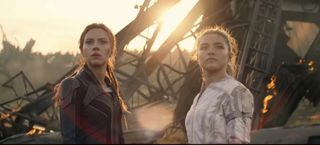
It seemed very in-character, that ultimate sacrifice she makes
Scarlett Johansson
With Natasha’s final fate sealed and her story satisfyingly told, Johansson was left questioning what was left to tell in a solo outing. For the film to be worthwhile, it would have to be creatively challenging and, as Johansson says, peel back the layers to “find the heartbeat of what this character’s journey has been”.
The key was finding Cate Shortland. Marvel has made a habit of taking well-regarded indie directors such as Taika Waititi, Ryan Coogler and James Gunn and giving them a multi-million dollar platform to tell superhero stories. Despite this, for Shortland – whose CV includes World War 2 drama Lore and kidnap thriller Berlin Syndrome – there was some hesitation at taking the job.
Sign up for the Total Film Newsletter
Bringing all the latest movie news, features, and reviews to your inbox
"Scarlett and I Skyped when I was in Australia,” she says, also over Zoom (Skype has fallen out of fashion during the pandemic). “I was still trying to work out whether I wanted to do the movie, because I just couldn’t believe that they were asking me. I just thought, ‘What a strange mix. Me and Marvel?’”
Hours of conversations were had but, eventually, the filmmaker was convinced this would be a character piece worth investigating. Shortland quickly began working with a Russian researcher to create background files on Natasha. “That was the first time that had been done in 10 years,” she continues. “And I remember Scarlett coming to me and saying, ‘God, I really am Russian.’ That was really great.”
Padding out Natasha’s background helped ground the character for Johansson like never before, and gave the writing team new material to delve into. From there, a time period was chosen: after Captain America: Civil War but before Avengers: Infinity War. “That specific moment [in Natasha’s life] gave us the opportunity to explore the character in a period where she belongs to no one: she has no family, she’s not working for an organisation,” says Johansson, who also acts as a producer on the movie and helped steer much of its development. “She’s really alone, and everything is quiet. It’s that quiet time that she’s been running from for basically her entire life, and now she has the opportunity to be self- reflective. And that’s when all this stuff creeps out.”
Under the skin
Digging head-first into Natasha’s story wasn’t simple. In fact, Johansson admits (with a laugh, though that could simply be a defence mechanism against a traumatic memory) that the whole scripting process was “extremely stressful” because there was so much of the character’s past to explore. “We came to a big pitch that was super-existential and very poetic,” Johansson says. “All those Post-It notes got taken out.”
The story soon morphed into something very few people, including the creative team, had expected – a family drama. However, it wasn’t Shortland who came up with that left-turn for Natasha, but Marvel’s leading producer, Kevin Feige.
"[That decision] was puzzling to me,” Shortland says. “And then I realised, by the end, that Kevin and I had similar visions. What I really wanted to do was to expose the character and get under her skin. The family created the dynamic with which that would happen. We see a different side of the character, because she’s in scenes with people that know her from when she was a child. She’s not a superhero in those scenes; she’s a daughter or a sister.”
These family moments are, judging by the trailers, both serious and funny. Florence Pugh plays Yelena Belova, a younger sister figure and fellow Black Widow. Likewise, Rachel Weisz’s Melina Vostokoff went through the same torturous training. And then there’s David Harbour’s fatherly Alexei Shostakov, better known as the Red Guardian – Russia’s less successful take on Captain America. At first, the three characters are antagonistic towards Natasha: she abandoned them to fight with the Avengers in America. But following the fallout of Civil War, she’s back with them – and it’s complicated to say the least.
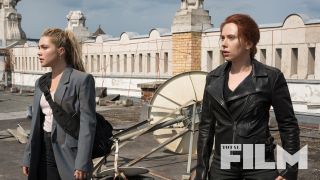
She's not a superhero in those scenes: she's a daughter of a sister
Black Widow director Cate Shortland
“The relationships that Natasha has with the other characters in this film are much more complex than any other relationships that you’ve seen her have,” says Johansson. “It’s that messy stuff. It’s the makeup of you. Your Achilles’ heel. The people that know which buttons to push, because they installed them. There’s so much expectation and disappointment. These people have gone through such trauma and loss.”
“Natasha has a fear of being loved,” Shortland adds. “She’s really Teflon- coated, and she’s a fetishised character. So you don’t see, often, the depth to her. What we wanted to see was her forgive herself and allow people in. I think that’s really beautiful because it allows the audience to see her in a different way.
"What I wanted to make sure was that I connected her to the universe,” the director continues. “I’m not talking about the Marvel Universe, but to a wider universe, so that the audience felt like she was connected to the spiritual world and she wasn’t just a woman in leather kicking ass, and that she was a vulnerable, raw, angry, illogical creature who’d been damaged as a kid. How do you make sense of that as an adult? And how do you forgive those around you that have caused the trauma?”
Seeing red
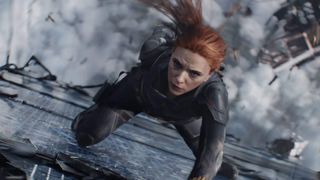
This all sounds, in comparison to the MCU’s house style of breezy crowdpleasers, quite heavy. You would be forgiven for forgetting that Black Widow is set in the same cinematic universe as Ant-Man, Guardians Of The Galaxy and Doctor Strange. The stark difference between this film and those other Marvel flicks becomes even more acute when speaking to Weisz and Pugh about their characters’ time in the hellish Red Room, the breeding ground for new Widows.
"It’s a pretty heavy-duty training where it’s very severe emotional, physical, psychological abuse and torture,” Oscar-winner Weisz says. “They all get hysterectomies.” It’s implied in Avengers: Age Of Ultron that Natasha couldn’t have children, but here we learn why that’s the case.
“One of the most interesting things about the film is how far Cate went with it,” Pugh, speaking over the phone, says. “This film is about the abuse of women. It’s about how they get involuntary hysterectomies by the age of eight. It’s about girls who are stolen from around the world. It’s so painful, and it’s so important.
“Part of the excitement for me is that women and girls from around the world are going to see this, and are going to see an abuse story that really was challenged by its own victims. For a Marvel film to be reaching all of those levels, it is so exciting. The best thing about that is, it’s not layered with this color of grey. You’ll see these women strive and be strong, and they’re assassins – and yet they still need to discuss how they were abused. It’s an incredibly powerful piece.”
For Shortland, Natasha’s story naturally leans towards these more serious subjects due to the very nature of the character in comparison to the other Avengers. “She’s the only character that doesn’t have superpowers,” she says. “We saw that as a strength, because she always has to dig really deep to get out of shit situations. And we just put her in a lot of hard situations. I thought about women walking to the train station being attacked, and what happens.
“Natasha’s like [Jodie Foster’s Clarice] from The Silence Of The Lambs. It’s great, because when she holds her gun, it shakes. But she’s still really tough inside, and resilient. And I wanted to bring that to the character. So you’re not just watching her fly through situations, knowing she’ll get out of it. You want to see her grit and determination. And that’s what we got.”

This film is about the abuse of women... about girls who are stolen
Florence Pugh
Johansson considers Black Widow “a very different film for Marvel, while still having all that great Marvel stuff that people have come to expect and love.” There’s the aspirational side and the bigger-than-life adventure. “But then it also has this other flavor that we’ve never experienced,” she says. “It’s really different than Avengers. It’s cool to see another facet like how Thor: Ragnarok or Black Panther were. There’s this other feeling about it. And part of it is because it was directed by Cate – it’s a Cate Shortland movie, but wrapped up in the Marvel Universe.”
Shortland will be the first woman to direct Johansson as Natasha, which seems almost criminal considering she has played the character in seven previous movies, not including a post-credits cameo in Captain Marvel.
“Her perspective is completely different,” Johansson continues. “She understands Natasha on a very visceral level. To put her artistic filmmaking credit aside – just her female perspective alone is a huge factor of what the end result is going to be. Within moments of seeing it, not only does it look like a Cate Shortland film, but you can feel that it was made from a female perspective. It’s just innately in there.”
Weisz agrees. “She really sees women, and all their behavior, and all their complexity,” she says. “The women are sexy and strong, but somehow not. They’re the subject, not the object. They feel like they’re in charge of their story, even though they look crazily sexy – I’m talking about Florence and Scarlett, of course.”
Shortland herself feels that Black Widow is an expression of herself, rather than another cog in the ever-winding Marvel machine. The studio allowed her to tell the nuanced, character-driven story she desired. “Kevin [Feige] said to me very early on, ‘We want you to bring your childhood, and your history, and what you believe in, and what you’re still testing,’” she says.
Keeping in the family
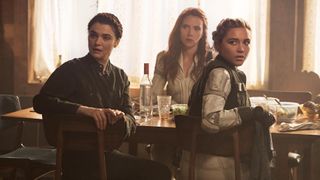
That’s not to say Black Widow doesn’t do things you expect from a Marvel movie. It’s “also very funny” says Johansson, which seems par for the course, and that humor mainly comes from the Red Guardian, Harbour’s character who the actor compares to The Office’s David Brent. “There’s something about Alexei where I always thought of him as not strictly comedic, but more just like the pathos of a small-town, indie, family-driven, weird movie,” Harbour says, having seemingly only just woken up: the Stranger Things and Hellboy actor is wearing a dressing gown while speaking to TF over Zoom.
“There’s a lot of fun in these Marvel movies: you’re going to fight these big, bad things, and you’re going on this big action-adventure. But in the midst of it, there’s a lot of personality and a lot of humor. And that was what I found so interesting about the script. I thought it was going to go in one direction with Alexei, where he is this tough, brutal guy. But also, underneath, there’s all this sweetness and weirdness, and all these sort of dad qualities to him. He wants to be liked. He has these emotional needs which are very funny to see in a guy like that, in a super soldier.”
Another character who will make an appearance in Black Widow is Rick Mason, played by O-T Fagbenle. We have yet to see Mason in the trailers, which has led many fans to suspect he could actually be masked villain the Taskmaster, who has taken over the Red Room and whose identity has not been revealed.
“I play a private contractor,” says Fagbenle. “He’s got contacts with the criminal underworld. He might work for military organizations as much as he might work for criminal organizations. He’s kind of an amoral agent in that sense.” Unsurprisingly, when pressed by TF, he cannot comment much more. “He’s a pretty fun character, and he’s got a great dynamic with Black Widow,” he laughs. “Boom! Spoiler! Splash!”
As well as having humor and action, Black Widow still factors heavily into the other events of the Marvel Cinematic Universe. Firstly, Shortland assures that the film will “honor” Natasha’s death in Endgame, while Johansson says it offers “resolution” for fans of the character. Then there’s the fact that Black Widow kicks off Marvel’s
Phase Four, which seems at odds with the previous Phase openers which have primarily focused on setting up future stories rather than “resolving” former ones. The key, it seems, lies in Pugh’s character Yelena.
Next gen
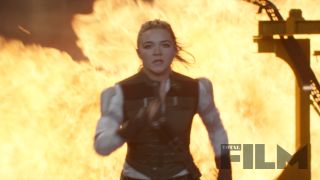
“It’s an origin story, but it also pushes into the future,” Shortland says. “You just get the sense that Yelena’s going to be a wild card, and that she won’t be a classic superhero. What’s great about Florence is she’s not interested in being a fetish. She’s angry about what’s happened with women. She’s angry about the injustices of how women have to look or behave a certain way. What’s fun in the character is, she explores that on screen. So you get this character that’s really irreverent, and who also just questions the whole superhero thing.”
With Johansson stepping aside as Black Widow, it would certainly seem that Pugh will step into the spotlight in future Marvel instalments. “I definitely felt that way from the very beginning,” Johansson says when asked about giving the Black Widow name over to new blood. “She stands completely on her own. She’s strong and different. She’s so different to Natasha.”
“You also see the generational difference, too, in how they react to things, and what they’re careful about, or what they’re careless about,” she continues. “It’s so fresh, what she does. It’s very representative, also, of who she is as a person. She’s unapologetic, and confident in herself, and curious, and brave, and emotionally brave – far more than I ever was. And that stuff all comes through. It’s wonderful to feel like you’re witnessing something great happening.”
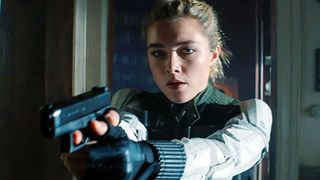
In every way, it's better to leave a situation when you're on top
Scarlett Johansson
Pugh, as you would expect, is flattered by Johansson’s words. However, she insists that, while everyone’s asking about what’s next for her character, Black Widow never feels like it’s trying to push Yelena on you. “This film really, really did feel like this was Natasha’s moment to rediscover her past, and address her pain,” she says. “My character kind of gave her that opportunity to. And even though everybody is desperate to figure out what’s next, even after watching it, that’s not what you are left thinking. You’re left finally feeling some resolve to Natasha’s character, for all those years. You’re left with understanding for all these people, especially her, and how she got the way that she did. So, it’s funny. I just felt great to be a part of it. I wasn’t really thinking about what’s next.”
Of course, Pugh’s not getting off quite that easy, and TF asks the dreaded question: is there more of Yelena in her future? “If you get asked to be in a Marvel film, and it was so thrilling and fun and exciting to be in, then of course, your head goes: ‘Oh my God. If this is what it’s like, then what else is next?” She replies. “If that happens and I am lucky enough that people appreciate my character, that’s an exciting road to go on. I would be silly to not be excited by it. I think that being part of the Marvel club is a great honor. But we’ll just see if people like Yelena first.”
Goodbye girl
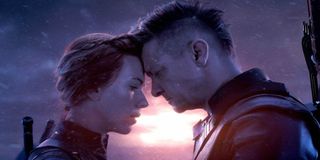
Although the name may apply to multiple characters, Black Widow, for legions of fans, still only means one: Natasha. This will be her final story, with Johansson preparing to wave ‘proshchay’ (that’s ‘farewell’ in Russian) to the cinematic universe she’s been part of for over a decade.
“It’s definitely bittersweet because I love my Marvel family,” she says. “I’m never going to be ready to not be a part of it. They’ll always be family. I’ll never feel ready to not be in it, because I hate to feel like I’m missing out on stuff with them. And who knows? Maybe at some point, we’ll have some opportunity to collaborate in some other kind of way.

12DOVE and Total Film celebrate the biggest movies coming to cinemas with the best features around
“It was certainly wonderful to be able to produce this with them, because I got to really know the process, and know them in a whole other intimate way. It was very exciting. At the same time, I really feel good about moving on from this chapter. I feel incredibly proud of this film. It’s so strong. It turned out so beautifully. It has so much love in it. Everything in it has intention and purpose. And, you know, I will always love Natasha. I’ve loved to play her, and I feel that she stands alone in this universe in a way that I feel really good about. And sometimes, you know, the most...”
She pauses for a moment. “In every way, and certainly as an actor, it’s always better to leave a situation when you’re on top. And to feel good about something. It’s great. And I feel on top with this. I really do. I’m really proud of it. So we’ll see how everybody else sees it!” she laughs. “But I will always love my experience of it.” Whether she comes back or not, Johansson has finally had the opportunity to go full circle and fulfil the potential that the character promised right from her screen debut 10 years ago: and she’ll hopefully wipe some of that red from her ledger.
Black Widow is in cinemas and on Disney Plus via Premiere Access from July 9. For more on the MCU, check out our guide to Marvel Phase 4.

Jack Shepherd is the former Senior Entertainment Editor of GamesRadar. Jack used to work at The Independent as a general culture writer before specializing in TV and film for the likes of GR+, Total Film, SFX, and others. You can now find Jack working as a freelance journalist and editor.
Most Popular





